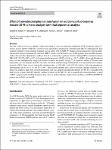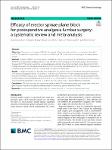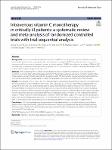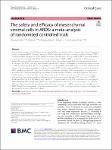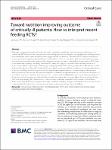Browsing by Subject randomized controlled trials
Showing results [1 - 5] / 5
The aim of this review was to update evidence for benefit of convalescent plasma transfusion (CPT) in patients with coronavirus disease 2019 (COVID-19). Databases were searched for randomized controlled trials (RCT) comparing CPT plus standard treatment versus standard treatment only in adults with COVID-19. Primary outcome measures were mortality and need for invasive mechanical ventilation (IMV). Twenty-Six RCT involving 19,816 patients were included in meta-analysis for mortality. |
The erector spinae plane (ESP) block is a newly defined regional anesthesia technique first described in 2016. The aim of this meta-analysis is to assess the efficacy of ESP block in improving analgesia following lumbar surgery. |
A recent landmark randomized controlled trial (RCT) in septic patients demonstrated an increased risk of death and persistent organ dysfunction with intravenous Vitamin C (IVVC) monotherapy, which represents a disparate result from previous systematic reviews and meta-analyses (SRMA). We performed an updated SRMA of IVVC monotherapy to summarize and explore heterogeneity across current trials and conduct trial sequential analysis (TSA) to guard against type-I or type-II statistical errors. |
Mesenchymal stromal cells (MSC) have shown potential efficacy in both animal and human trials of acute respiratory distress syndrome (ARDS). Especially during the COVID-19 pandemic, MSC was intensely studied for treating COVID-19-induced ARDS. The purpose of this study is to evaluate the safety and efficacy of MSC in ARDS via a meta-analysis of randomized controlled trials (RCTs). Therefore, a meta-analysis of RCTs of MSC as a therapy for ARDS was conducted. The protocol of this review was registered on Open Science Framework. With no language restriction and according to the “PICOs” principle, searches were conducted on Pubmed and Embase to retrieve any clinical literature on MSC for... |
Toward nutrition improving outcome of critically ill patients: How to interpret recent feeding RCTs? Although numerous observational studies associated underfeeding with poor outcome, recent randomized controlled trials (RCTs) have shown that early full nutritional support does not benefit critically ill patients and may induce dose-dependent harm. Some researchers have suggested that the absence of benefit in RCTs may be attributed to overrepresentation of patients deemed at low nutritional risk, or to a too low amino acid versus non-protein energy dose in the nutritional formula. |

